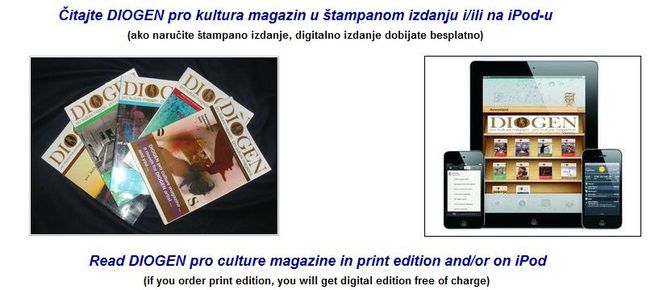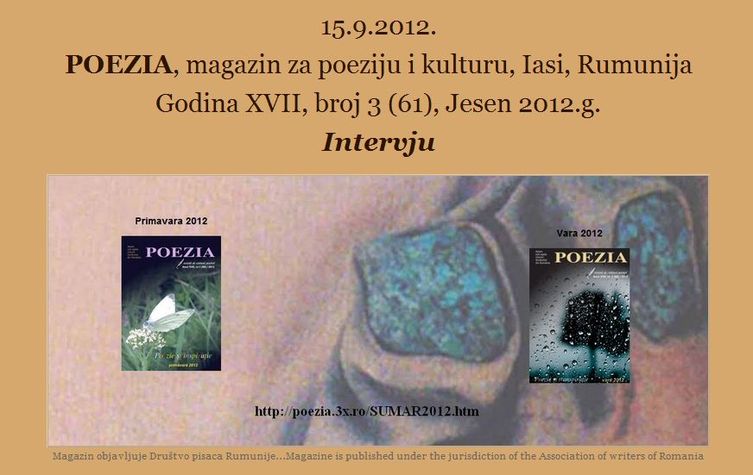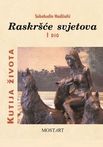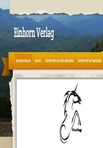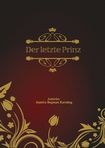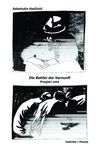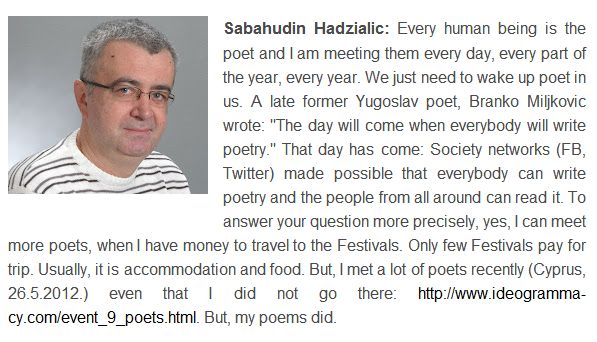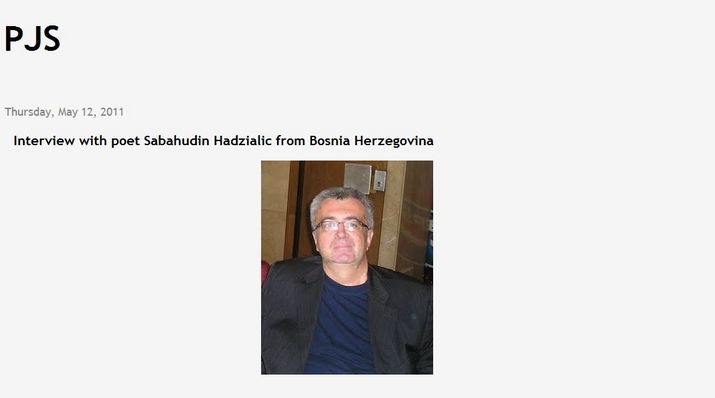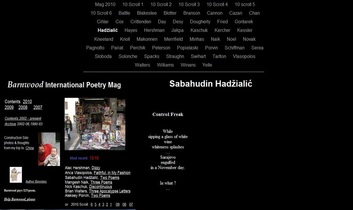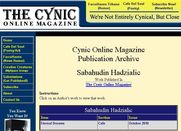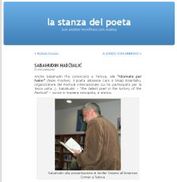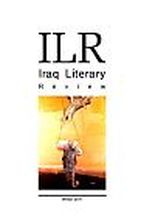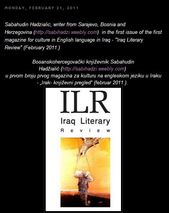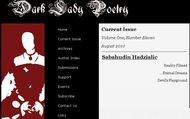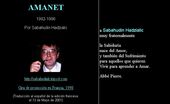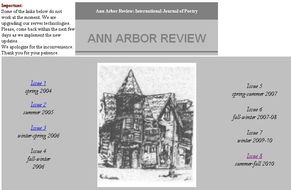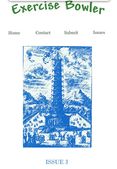Interview of Editor in chief to POEZIA, magazine for poetry and culture from Iasi, Romania, 15.9.2012.
Narudžba knjiga / Purchasing of the books / Bücher bestellen
|
|
|
Interview given by the side of Editor in chief of DIOGEN pro culture magazine, Sabahudin Hadzialic for the Blog of Patrick Sammut, MALTA...19.8.2012.
Intervju gl. i odg. urednika DIOGEN pro kultura magazina za TV HEMA, Sarajevo, 10.4.2012.
Interview given by the side of Editor in chief of DIOGEN pro culture magazine, Sabahudin Hadzialic for the Blog of Patrick Sammut, MALTA...12.5.2011.
Patrick Sammut has Masters degree in Contemporary Italian Literature (University of Malta). Member of local (Malta) literature associations. Vice-President of Maltese Poets Association, founded in 1975. Author of various literary critics and articles on local Maltese newspapers and journals.
Editor of poetry magazine VERSIMALTA.
In English...just click on photo bellow...
Or read here..:
1. Who is Sabahudin Hadzialic as a person? His origins, place of birth, pastime?
Sabahudin Hadzialic had a country. He was born in a county called Yugoslavia and today lives in country called Bosnia and Herzegovina, which was once a part of Yugoslavia. None of this was his fault. The country he lives in today was once a part of Yugoslavia under the same name, but as a federal unit. Today, on the territory of now former Yugoslavia (since 1991) six (6) new states were formed. Twenty years after the breakup of former Yugoslavia, and fifteen years after the terrible war in this region, none of the newly formed states did not reach the gross national product of former Socialist Federative Republic of Yugoslavia. No, we do not want to recreate any form of obnoxious piece of art driven by ethnicity in an artificial form of federation consisting of peoples and states. No ! I, as a writer, honour the decision of people and state to live, the best that they can, in what they call their own, regardless of the name. I am not Yugo-nostalgic. I am only people-nostalgic. Simply, I cannot but think that long time ago, in that terrible, narrow-minded and rotten political system we were better as people. Contradictio in adiecto ? No, because you can find the answer in one of my aphorisms: Socialism was a rotten system. Capitalism brought it to the end. Sabahudin Hadzialic is Bosnian, that is to say a Muslim from Bosnia and Herzegovina. But first and foremost, Sabi is human and then all the rest. Nation is historic category and I have a saying: if someone can prove to me the nationality of amoeba ( and amoeba is the predecessor of all living things) I will burn myself alive at the nearest square. On the other hand, we just need to wait for the end of history to see if anyone who has nationalistic tendencies will be remembered. I think not !
2.From where comes your interest for culture and poetry?
I think that the answer is in the question. Well, anything human sticks with me. My opinion is that we are all here for a reason, starting from the fact that we all carry presuppositions of a creative process, an inspiration. Simply, our social surroundings, our outlook and how we understand the reality lead our thoughts to certain hopes and activities. Culture, art, poetry, writing all is a part of human creation aimed to enrich the messages we want to leave or will leave to the world, to the humanity. I think that, and I cannot but say that I was not inspired by their writing, I was influenced by the witters like Mihail Bulgakov (Russia), Charles Bukovski (USA), Witold Gombrowicz (Poland) and Walt Whitman (USA) but also, domestic authors (ex-Yu): Danilo Kis, Ivo Andric i Mesa Selimovic. I hope that one day my writing will motivate people so that they start to appreciate art and literature in general, to look for not only their literary but also human direction, in the works of contemporary writers. What I want to say is that it is not enough to be ‘good’ writer and/or poet. It is important to be a good man, after all. But this river is wide and deep. And we need to cross it. And the rivers should be crossed. Only a few will cross over. On the other side is the paradise made of hopes in the world of possible directions. Human, first and foremost.
3. What are your main activities today?
Methodologically tangible and in short: To live a life like a man (human). Well, let me explain. As you on Malta have people who, at a certain period of their life, were green, then yellow and then red, so that today they are looking for the reason d’etre in blue; we had the very similar experience in Bosnia and Herzegovina as well as in all the present states formed on the territory of former Yugoslavia. Let me explain, or at least try: There is a saying that everything changes except the rock; the change that evolves because one is adjusting to the time and environment where one lives should not be at the expense of ones humanity, sincerity , openness and goodness. The opposite happens in this country. Well, just look how expression of religious feeling damaged religion per se: Religion (regardless which one we are talking about) is advocating goodness, gentleness, justice, fairness, openness and kindness. So we have never had so much pious people and so much thievery at the same time. Another one Contradictio in adjecto ! The fact is that the word Balkans when translated from archetypal language means ‘The Blood Mountain’ says it all. But, this is not what I want to talk about now. Well, my main activities are focused towards good deeds. Not only through literature. You may want to read yourself on the following links (in English as well):
http://humanitariansabi.blogspot.com/ and/or
http://srcezadjecufbih.tripod.com/ and/or
http://sabimariefrancois.blogspot.com/2010_01_01_archive.html
And of course, as a independent artist, and the member of Association of writers of Bosnia and Herzegovina and the Association of Journalists of B&H (and from the beginning of this year I am the Ambassador of B&H of the POETAS del MUNDO:
http://www.poetasdelmundo.com/verInfo_europa.asp?ID=7203 I edit two on line magazines. One of them is published as a yearly edition : DIOGENES pro-culture magazine (the first yearly edition was promoted at POETRY MARATHON held in Sarajevo on 21 March 2011 to mark a Word Poetry Day: http://diogen.weebly.com/2132011---world-poetry-day.html ).
So, www page of DIOGENES pro-culture magazine is http://diogen.weebly.com and it promotes culture and art. DIOGENES pro-culture encompasses two other magazines DIOGENES pro-art where we represent the artists from around the globe and DIOGENES pro-youth where we represent young poets.
The other magazine that I edit, although I say, that there is no difference between me as an editor-in-chief and the others, is MaxMinus, an online magazine for political satire, humour , caricature and comics in the Balkans: http://maxminus.weebly.com . I think that here you have a complex person who is a poet by vocation, and loves prose mixed with satire. Although my love poems were published in the Anthologies around the world. I am also a freelance editor of DHIRA publishing house in Switzerland: http://dhirasbk.weebly.com/ .
4. Can you give us some information about your writings and publications? What is your favourite genre ? Why ?
When being interviewed for the local media (please view entire interview given to BH MAGAZINE http://www.bhmagazin.com/interview/1149.html ) I often said: When I was twenty I was the editor on Radio Sarajevo, when I was thirty I was the owner of the first private owned newspapers In Bosnia and Herzegovina, when I was forty I had already published a dozen of books and now at the age of fifty (poetry and prose) I am represented in a number of compilations, magazines throughout the world in English, Spanish, German, Albanian, Italian and the languages of the Balkans, that is the South Slav habitat. My books could be found in the libraries around the world, from New York Public Library in the USA on the Northern Hemisphere all the way to the homes in Australia on the Southern Hemisphere.
Well, the best would be to visit http://sabihadzi.weebly.com and judge for yourself. There you can view more than hundred video records of my performances around the globe, as a writer of poetry and prose, as well as journalist: http://sabahudinhadzialicvideo.blogspot.com .
And last but not least, I published dozen of books, six books of poetry, one haiky, aphorisms and a drama, a book of political and literature essays, and a book of aphorisms and a book of short stories. I am represented in the poetry anthologies in Canada, France and Bosnia and Herzegovina. Also in anthologies of aphorisms of the Balkans and Bosnia and Herzegovina. I edit and write book reviews. Recently Plain View Press form Texas, USA published ISHTAR SONGS and I was one of the writers selected to do the book review. Ishtar Songs was an Anthology of Iraqi poetry from ‘70s to present days http://www.plainviewpress.net/gallery2/pages/Ishtars-Songs.html .
There are some plans to publish Anthology POETS FOR WORLD PEACE, Volume 3 in Canada and India where I am co-editor alongside my colleague and writer Dr. Ram Sharma from India. Forty five poets were selected to be represented, one of them being Patrick Summit from Malta.
It is not easy to answer the second part of your question that refers to my favourite genre. The literature, the way I see it, is the art of the words. The words form poems, stories, aphorisms, inspirational sayings , texts of all kinds, dramas, commentaries, novels, essays….I think that it all depends on time of the creation. Within the inspiration guided by lyrics, I create a number of poems, and on the other side I deliver variety of prosaic texts that inspired by its sub-genres. I do not want to say that I prefer any genre at the expense of the other. How successful I am as the author within the many layers I have is best demonstrated by this year’s award of Ivo Andric’s Academy form Belgrade.
The Jury, presided by Radomir Smiljanic, one of the bards of Serbian literature, having read my LITERARY TRIOLOGY (aphorisms, short stories and poems) unanimously voted for the award. TRIOLOGY was published in 2010. This prestigious award is named after the author, born in Bosnia and Herzegovina, who won the Nobel Prize for Literature in 1961. His name is Ivo Andric.
The Jury’s decision based on the Literature Trilogy (poems: The Sisyphus’ Struggle, stories: The Country Without Consciousness and aphorisms: Lost Souls, published y Dhira, KUsnacht, Switzerland 2010) is:
“The poetry of Sabahudin Hadzialic in his book Sisyphus’ Struggle is laden with complex concepts depicting struggle for the human side of mankind amidst daily issues alternating it with the idea of love memories. Hadzialic’s poetic idea is focused: it is post-modern, urban poetry of a man in search for the meaningful life….The book The Country Without Consciousness represents a joint aim – stripping of myths we struggle with in our daily lives, while often using a range of allegories, hyperbolas and our own expectations all underlined with a satire. In Lost Souls, a book dedicated to aphorisms, Hadzialic uses aphorisms and thoughts as currency, he introduces humour and satire, he tries and succeeds to influence others with the way he understands the world he lives in hoping that his influence will inspire readership to strive for the bigger and better things.
As one can see in Andric’s writing, Hadzialic in his literature conveys a message, he warns, inspires; he demonstrates that the literature stems from the everyday life of a man and then a poet and writer, that it stems from his core-the human core."
The award will be presented to me on 26 October 2011 in Belgrade, Serbia on the very same day when Ivo Andric was awarded the Nobel Prize in Stockholm 50 years ago. This award does not only belong to me as a writer, it is an award for Bosnia and Herzegovina, for all its writers, my contemporaries, regardless whether they are Moslems, Catholics or Orthodox. It is for the people of Bosnia and Herzegovina , after all.
5. What are the main themes in your poetry ? How does the past war in the ex-Yugoslavia territory reflect itself in your writings ?
Topics are hidden in human mind, they emerge from hopes and internal struggles. As a person who loves and respects, I find my inspiration in people and nature around me with the aim to promote sustainability and prosperity of the mankind, I think that my themes are grouped around what makes us human: love, truth, , envy, hatred, arrogance, justice, morality………Although I answered in part the second part of your question in the answers provided so far, I think that, being an integral part of the Bosnian society , I deeply feel and interpret the events from the recent war in Bosnia and Herzegovina. But, as a person who wrote during the war ‘No man No Island’ (quoting No man No Island from Ernest Hemingway) I have to say that the war, on one side, brought a positive. You may be wondering – how this could be ? Well, it is only then that one can see people in their banality, greed, hatred and you ask yourself – how this could be possible. I can say this because I am a transparent person, this is my strength and some would say my weakness. I don’t know. You can track what I thought before the war, during the war and after the war. I think that I can quote here the answer I gave to BH MAGAZINE back in 2009.:
Q: When looking at the writer or journalist as an individual you brand him as an outsider or traitor. Each national elitist circle wants the truth, regardless of the fact that it is based on how aggressive you are in putting the arguments through, not on how strong are the arguments. Who are the outsiders and traitors?
A: I would not entirely agree with your statement. To answer your question I will put through my hypothesis that it is possible to be individualist in the arena of literature and journalism and ‘not only’ with the aim to be outsider of traitor. Polarization never appealed to me. Even in questions. If you live in a state where there is prosperity stability, expertise and hope anything could be achieved. Unfortunately, not on this planet. Well, well the population of B&H is the same as of a London suburb, while the area is the same as a part of South France. And we want to think that we are important. Manchester United soccer games are viewed by millions of people while they watch about us only when we are killing each other, right? And of course, we are here ruled by ‘ muscular ‘arguments not by the powerful arguments, as the president of the Council of Ministers is a person who was a member of six different political parties so far, the emerging writers in their ‘60s, journalists ready to write absolutely anything to glorify the new leaders today, and then to dethrone them tomorrow without having critical thought to see in the first place that they were not leaders at all. Good question, well asked and the answer is simple: All of us are outsiders and traitors. At the moment when we agree with them…’those who plant black and white truths’ and at that very moment we become exactly that. It does not make any difference if this is being done by the communists, nationalists or neoliberals.
We cannot be anything else while we live in the system of upside-down values, the system that was established in the couloirs of the house of Rothschild’s, Kissinger’s, Brzezinski’s, Cheney’s and Committee 300. The New World Order abolishes the right of individual needs, of communities, of peoples. And it promotes the supremacy of new vision of World Government where we in Bosnia (and Herzegovina) are the by-the-way experiment of their disjointed, individual and pretentious thoughts. I am anti-globalist. I am human. Who looks at the consumer society as a society where your basic needs will be met? The needs to live. And then we come across PR and Marketing, although these are two different terms, and this is the answer to your question. As an addition to what I already said: p.s. in the question itself.”
Yes, in my writing you can clearly see the reflection of the environment I live in. Now I am focused on love, devotion, anticipation, aspirations, happiness… and write poetry inspired by these elements.
6. You are a person who believes in poetry as unity. Can you elaborate in regards to this statement?
The answer is very simple and it could be found in the Manifesto of the POETS del MUNDO http://www.poetasdelmundo.com/verManif_ingles.asp?ID_Manifiesto=128 as a poet and a man I not only read, but live in accordance with these principles. Let me clarify: Poetry is a message expressed through verse – the message of a poetry that unifies and not hate – that wraps and not exposes – that loves but not owns. This is the unity of poetry within my understanding of poetry that I try to achieve in my poems.
7. You also believe in giving opportunities to others to express themselves? You believe in giving, more than taking? How is this related to your DIOGENES pro-culture magazine?
Great observation, thank you. I think that giving the opportunities to the others to express their thoughts, in this case literary and artistic, is the expression of ourselves. All that we write, and hand over to the readers urbi et orbi, is not ours, it belongs to the others who read it, watch it, hear it. When we give, we create the opportunity to be given, one day, somewhere. And if I were to be born again, I would not change anything in my writing or the humanitarian work I did. This part of me would not change. Now that we are talking about DIOGENES pro-culture magazine, I believe that the answer is in my introductory article as the editor-in-chief:
WAKENING OF THE POSSIBLE
Within the each editorial of any newspaper, magazine and/or web portal, all editors are trying to describe the use of the title itself and in other words „carrier“ of the sign of the used presumptions of the carrier of the activities which are planned within probable media possibilities. Editor of this site will not do that. Because of the few reasons:
1. This is the free site and magazine of the free-open-minded intellectuals of the area wider than „encircled“. Namely, virtual world gives numerous numbers of possibilities for the communication but in the same time it is of use for the never dried out source for the huge number of information. But, this information, as well all represented here, on this site, will be in the services of the promotion quality of good and/or good quality. „Quality of the good and/or Good of the quality“ in literature, philosophy, world of cartoons and politics and/or information within whole shape of human living called culture and art. The one put aside and possible. Quality one.
2. This is a free magazine, site-web portal of the persons who do not hate and do not want to hate but only to hate impossibility to express/represent the mission of free-open-minded assumed wills. We are human-nostalgic persons who would like to live the life of the free people with appreciation of the other and different one human being. And not to based that on the name he/she caries but only to be based on the character of the assumed „good of the quality and/or quality of the good“ which represents.
3. We do not want renewal any kind of ugly/rude/cruel shape not only of cultural and artistic activity of the special entities shaped up in one artificial shape above all-of some kind super-state of some community of the people and/pr states. No! We respect decisions of the people and states in which they are living at, as much as possible more and in a quality way within their states, whatever they call them and wish to.
4. We would like that all artists of all races, colors, nations, people to join us...i one word from the area of the Planet regardless the language and God they pray to.
5. However, we will never publish anything (and not even allow to be published here) any kind of contents which derogate the human being in any kind of way per se and in other words anything that makes him human being within whole encircled environment of his own.
6. In the same time, DIOGENES is the area of the open free-open.minded dialogue because of the common good, above all. To do good. Because good gives good.
7. Coordination is the mother of the success. We are here to coordinate your talents, hopes, knowledge skills and wishes. We do not want to in any moment above you. Just aside and with you.
I would like to invite you to send us your own works, information and everything you consider the relevant and important for the creation of the possible, quality living and creation. To learn together. Us. And you.
Welcome to our world. But also yours. Because of us. And you.
8. You have been one of the active participants in the Gaeta Mediterranean Poetry Festival 2011. How do you describe such a experience ? Why are such initiatives important in today’s world?
In one sentence: Because of my children ! Firstly, I’d like to thank Giuseppe Napolitano, director of the Association La Stanza del Poeta from Gaeta, Italy, the poet and the Festival organiser and all participants who enriched my soul and secondly I’d like to say that I do not regard it as only the’ initiative’. It is foremost a sublime, subtle creation where poetry helped not only establish friendships, but define humanity as our centre of gravity which is nothing else but us. The poets are the messiahs – they bring words. Only if they use the words for the greater good. Because goodness breads goodness. Within the concept of ‘doing’. And hope. When we speak about initiatives, that is to say creations unified through poetry their meaning is the same as it ever was. Why, you may ask? Because it inspires, enthuses and gives hope that we can live in a different world. Check it out ! View the video record, photos and press releases http://diogen.weebly.com/yacht-med-festival-il-mediterraneo-in-poesia-2011-italia.html They speak more than thousand of words, although Turgenev said : ”There is nothing more powerful…and at the same time noting more weak…than a word”.
Sabahudin Hadzialic
Sarajevo
Bosnia and Herzegovina
08.5.2011.
Na bhs jeziku ovdje...
Intervju gl. i odg. urednika DIOGEN pro kulture magazin, Sabahudina Hadžialića za Blog Patrick Sammuta sa Malte...12.5.2011.
Patrick Sammut je magistrirao suvremenu talijansku književnost (Sveučilište Malta).Član je Udruženja književnika sa Malte. Potpredsjednik Udruženja Pjesnika sa Malte,osnovane 1975..g. Autor je mnoštva književnih kritika i tekstova u malteškim novinama i časopisima. Urednik je poetskog časopisa VERSIMALTA.
ODGOVORI NA PITANJA PATRICKA SUMMITA za blog:
http://patrickjsammut.blogspot.com/2011/05/interview-with-poet-sabahudin-hadzialic.html
1. Ko je Sabahudin Hadžialić kao osoba? Njegovo porijeklo, rođenje?
Sabahudin Hadžialić je imao domovinu. Rođen je u jednoj državi koja se zvala Jugoslavija a danas, najmanje svojom greškom, živi u jednom dijelu te bivše države, koja se zove Bosna i Hercegovina. I dok je bila dijelom Jugoslavije, istog imena je bila, ali kao federalni dio te države. Danas, na mjestu bivše države je (od 1991.g.) uobličeno 6 (šest) novih država koje, i poslije dvadeset godina od raspada bivše Jugoslavije, a petnaest godina poslije nezapamćenog rata na ovim prostorima, nisu dostigle bruto društveni proizvod te Socijalističke Federativne Republike Jugoslavije. No, ne želim obnavljanje bilo kojeg nakaradnog oblika ne samo kulturnog i umjetničkog djelovanja posebnih entiteta uobličenih u jedan vještački, artificial oblik neke zajednice naroda i država. Ne! Ja kao književnik, poštujem odluke naroda i država da žive, što je moguće više i kvalitetnije unutar svojih država, kako god ih nazivali i željeli to. I nisam jugonostalgičar. Samo sam ljudonostalgičar. Jednostavno, nikako se ne mogu oteti utisku da smo nekada, u tom užasnom, lošem i trulom sistemu, ipak bili bolji ljudi. Contradictio in adiecto? Ne, jer odgovor se nalazi u jednom mom aforizmu: Socijalizam je bio truo sistem. Sa kapitalizmom je proces završen. Sabahudin Hadžialić je Bošnjak, odnosno Musliman iz Bosne i Hercegovine. No, Sabi je na prvom mjestu čovjek i zatim sve ostalo. Nacija je historijska kategorija i ja imam običaj kazati da ako mi neko dokaže koje je nacionalnosti ameba (a ona je preteča svih živih bića), odmah ću se zapaliti na prvom obližnjem trgu. S druge strane valja nam samo sačekati kraj historije da vidimo da li će neko i ostati kao ljudski odsjaj nacionalnih stremljenja. Teško!
2. Odakle dolazi vaš interes za poeziju?
Mislim da se odgovor nalazi upravo u pitanju. Naime, ništa mi nije strano što je ljudsko. Lično smatram da svako od nas ima sopstveno poslanje na ovom svijetu, polazeći od činjenice da svi mi nosimo pretpostavke određenih kreacija, nadahnuća. Jednostavno, društveno okruženje, smisleno gledanje i poimanje stvarnosti usmjeravaju naša viđenja ka određenim ljudskim nadanjima i aktivnostima. Kultura, umjetnost, poezija, spisateljstvo je dio ljudske kreacije usmjerenje nadogradnji vlastitih poruka koje ostavljamo i/ili ćemo ostaviti svijetu kao mislena bića. Mislim da su, a ne mogu kazati da nisam bio podstaknut njihovim pisanjem, veliki uticaj na mene ostavili književnici Mihail Bugakov (Russia), Charles Bukovski (USA), Witold Gombrovič (Poland) i Walt Whitman (USA) ali i domaći autori (ex-Yu): Danilo Kiš, Ivo Andrić i Meša Selimović. Nadam se da će možda i moj rad jednog dana podstaći osobe, one koje dolaze i ulaze u svijet književnosti i umjetnosti, da svoja književna, ali i ljudska usmjerenja traže u inspirativnim djelima svojih savremenika. Ono što želim naglasiti je da nije dovoljno biti „dobar“ pjesnik i/ili pisac. Valja nama biti dobar čovjek, prije svega. No, ta rijeka je široka, ali i duboka. I valja nama preko te rijeke. Rijetki će je preći, ali vrijedilo je. Na drugoj strani je raj nadanja u svijetu mogućih usmjerenja. Ljudskih, prije svega.
3. Koje su glavne vaše aktivnosti danas?
Metodološki konkretno i kratko: Živjeti životom dostojnim čovjeka. Ipak, da i objasnim. Kao što i kod vas na Malti postoje ljudi koji su u jednom periodu svog života bili zelene boje, zatim žute a iza toga crvene, da bi danas, svoju refleksiju življenja tražili u plavoj boji, tako nešto se dešava i u Bosni i Hercegovini, odnosno u svim državama nastalim na prostoru bivše Jugoslavije. Da pojasnim, barem da pokušam: Tačna je izreka da se sve mijenja osim kamenja, ali to mijenjanje i prilagođavanje vremenu i prostoru u kojem živiš ne smije biti nauštrb tvoje ljudskosti, iskrenosti, otvorenosti, plemenitosti. Ovdje se dešava upravo obrnuto. Naime, uzmite samo primjer religioznosti koja je na prostorima Balkana dovela do uzurpacije religije per se: Religija (bez obzira o kojoj religiji govorimo) promoviše dobrotu, blagost, ljubav, pravdu, pravednost, poštenje. A nikada više vjernika nije bilo, a nikada više lopovluka. Još jedan Contradictio in adiecto! Ipak činjenica da riječ Balkan u prevodu sa arhetipskog jezika znači „Planina krvi“ sve govori. No, ta priča je za neku drugu priliku. Dakle, moja glavne aktivnosti su usmjerene činjenju dobra. Ne samo kroz književnost. Da budem još konkretniji, može se pročitati i
na engleskom jeziku: http://humanitariansabi.blogspot.com/ i/ili
http://srcezadjecufbih.tripod.com/ i/ili
http://sabimariefrancois.blogspot.com/2010_01_01_archive.html
I, naravno, trenutno, kao Samostalni umjetnik, član Društva pisaca Bosne i Hercegovine i Društva novinara BiH (a od početka ove godine sam i Ambasador POETAS del MUNDO u mojoj državi: http://www.poetasdelmundo.com/verInfo_europa.asp?ID=7203 ) uređujem dva online magazina, od kojih se jedan pojavljuje u štampanom obliku u godišnjem izdanju: DIOGEN pro kultura magazin (nedavno je i promoviran i prvi broj GODIŠNJAKA DIOGEN pro kultura na POETSKOM MARATONU održanom u Sarajevu, 21.3.2011.g. povodom SVJETSKOG DANA POEZIJE: http://diogen.weebly.com/2132011---world-poetry-day.html )
Dakle, WWW adresa DIOGEN pro culture magazina je: http://diogen.webly.com a magazin je časopis za kulturu i umjetnost. Unutar DIOGEN pro kultura magazina iz Sarajeva, Bosna i Hercegovina nalaze se i još dva magazina: DIOGEN pro art (predstavljamo likovne umjetnike iz cijelog svijeta) i DIOGEN pro youth (predstavljamo mlade pjesnike).
Drugi magazin koji uređujem, mada imam običaj naglasiti da sam, kao gl. i odg. urednik, samo prvi među jednakima, je MaxMinus, online magazin za političku satiru, humor, karikaturu i strip na Balkanu: http://maxminus.weebly.com . Mislim da se ovdje radi o isprepletenosti ličnosti osobe koja je poetske vokacije, ali prozno satirične potke, odnosno usmjerenja. Mada su moje ljubavne pjesme našle mjesta u Antologija širom svijeta. Također sam i freelance urednik u Izdavačkoj kući DHIRA iz Švajcarske: http://dhirasbk.weebly.com/.
4. Možete li nam dati nešto više informacija o vašem pisanju i publikacijama, objavljenim djelima? Koji je vaš omiljeni žanr?
Dajući intervjue za lokalne medije ( jedan od njih je i online u potpunosti i dat je BH MAGAZINU: http://www.bhmagazin.com/interview/1149.html ) u Bosni i Hercegovini imao sam običaj reći: Sa dvadeset godina sam bio urednik na Radio Sarajevu, sa trideset sam bio vlasnik prvih privatnih novina u Bosni i Hercegovini, sa četrdeset sam imao desetak knjiga iza sebe, a u pedesetim sam (poezija i proza) zastupljen u mnoštvu zbornika, časopisa širom svijeta na engleskom, španskom, njemačkom albanskom, italijanskom ali i na jezicima Balkana, odnosno Južnoslavenskim prostorima. Moje knjige se nalaze u bibliotekama i kod čitalaca širom svijeta, od New York Public Library u USA na sjeveru do domova u Australiji na jugu ove naše Zemlje.
No, mislim da je najbolje posjetiti: http://sabihadzi.weebly.com i sve ce vam se samo kazati. Tu mozete pronaci i oko 110 video zapisa o nastupima širom Svijeta u kontekstu književnosti, poezije i proze, ali i kao novinar: http://sabahudinhadzialicvideo.blogspot.com .
I posljednje, ali ne i zadnje, objavio sam deset knjiga, od kojih je šest poezije; jedna knjiga kratkih crtica, aforizama i drama; jedu knjigu politikološko/književnih eseja, jednu knjigu aforizama i jednu knjigu kratkih priča. Zastupljen sam i Antologijama poezije Kanade, Francuske i Bosne i Hercegovine. Također i u Antologijama aforizama Balkana i Bosne i Hercegovine. Uređujem knjige drugih autora ur preporuke za štampu, odnosno recenzije. Upravo je objavljena i knjiga od strane The Plain View Press iz Texasa (USA) naziva PJESME IŠTARA (Ishtar's songs), odnosno Antologija Iračke poezije od sedamdesetih godina do danas gdje sam bio jedan od recenzenata: http://www.plainviewpress.net/gallery2/pages/Ishtars-Songs.html a u planu je tokom 2011.g. i objava Antologije POETS FOR WORLD PEACE Vol.3 u Kanadi i Indiji gdje sam ko-editor sa kolegom književnikom Dr. Ram Sharmom iz Indije. Bit ce predstavljeno 45 pjesnika koje sam odabrao za Antologiju, a među njima su i tri pjesme Patricka Sammuta sa Malte.
Teško je odgovoriti na drugi dio vašeg pitanja koji se odnosi na žanrove unutar književnosti koji su mi, hajde da kažem, najdraži. Književnost je, po meni, umjetnost riječi. A riječi stvaraju pjesme, priče, aforizme, crtice, tekstove, drame, komentare, romane, eseje...Mislim da sve zavisi od vremena, trenutka kreacije. Unutar nadahnuća usmjerenog poetici, iz mene izlazi mnoštvo pjesama a s druge strane, prozi usmjeren kreiram prozna nadahnuća, unutar njenih podžanrova. Ne želim preferirati nijedan žanr nauštrb drugog. A koliko sam kao autor uspješan unutar vlastite višeslojnosti, mada će biti to malo neskromno naglasiti, mislim da upravo dokazuje ovogodišnja (2011.g.) nagrada Akademije „Ivo Andrić“ iz Beograda koja je jednoglasnom odlukom žirija, kojim je predsjedavao respektabilni književnik Radomir Smiljanić iz Beograda, upravo KNJIŽEVNOJ TRILOGIJI (aforizmi, priče i pjesme) koju sam objavio 2010.g. dala prestižnu nagradu sa prostora ex-Yu koja nosi ime po jedinom autoru, rođenom u Bosni i Hercegovini, koji je dobitnik Nobelove nagrade za književnost 1961.g., uvaženom Ivi Andriću. Obrazloženje Žirija koje se odnosi na KNJIŽEVNU TRILOGIJU (pjesme: NEOTKANI SIZIF; priče ZEMLJA BEZ SVIJESTI i aforizmi NEDOVRŠENE DUŠE, Izdavač DHIRA, Kusnacht, Švajcarska, 2010.g.):
„Poezija Sabahudina Hadžialića u knjizi „Neotkani Sizif“ je protkana s različitim vizijama usmerenim borbi opstojnosti bitka javstva unutar svakodnevnih sunovrata koje proživljavamo s povremenom refleksijom i prema ljubavnim reminiscencijama. Njegovo poetsko viđenje je ciljano: post-moderna, urbana poezija čoveka što živeti traži.....Knjiga priča "Zemlja bez svijesti" je konglomerat zajedničkog cilja - razotkrivanja mitova s kojima se svakodnevno suočavamo, neretko uz korištenje svakovrsnih alegorija, hiperbola, ali i vlastitih pozitivnih očekivanja, uz satiričnu potku. U knjizi aforizama "Nedovršene duše", koristeći aforizam i misao kao vrednosni iskaz snažnog odjeka, uz korištenje humorno-satirične note, ali i on pokušava, i uspeva, neka svoja promišljanja preneti drugima uz nadu da to iskoriste dobru stremeći. Istovremeno, njegovo delo je, kao i kod našeg Nobelovca, Ive Andrića, upozoravajuće i nadahnjujuće, unutar promišljanja da opstojnost književnosti i jeste svakodnevnost upitanosti usmerene prema sveobuhvatnosti sopstvenog poslanja. Književnog, ali i ljudskog, pre svega.“
Nagrada Akademije „Ivo Andrić“ će mi biti uručena u Beogradu, u Srbiji, 26.10.2011.g., na dan kada je Ivo Andrić dobio Nobelovu naradu u Štokholmu, prije punih 50 godina. To nije nagrada samo za mene kao pisca već i nagrada za Bosnu i Hercegovinu, za sve njene književnike, savremenike moje, bez obzira da li su muslimani, katolici ili pravoslavci. Za sve ljude, prije svega, Bosne i Hercegovine.
I mislim da se upravo u gore navedenom nalazi i odgovor na vaše posljednje potpitanje. To ZAŠTO je u stvari sadržano u višeslojnosti autorskih snoviđenja ovoga autora.
5. Koje su glavne teme koje obuhvaća vaša poezija? Na koji se način rat na prostorima bivše Jugoslavije reflektirao u vašem pisanju?
Teme su sakrivene u ljudskoj psihi i njenim najavama, nadanjima, težnjama. Kao osoba koja voli, poštuje, cijeni, inspiraciju nalazi u drugim ljudskim bićima, ali i prirodi usmjerenoj održanju i blagodetima ljudskoga roda, mislim da su moje teme upravo sve ono što nas ljudima čini: ljubav, istina, nada, zavist, mržnja, osionost, pravda, pravednost...A iako sam djelimično odgovorio na drugi dio vašeg pitanja u prethodnim odgovorima, mislim da kao osoba koja jeste društveno biće itekako može osjetiti i reflektirati dešavanja iz netom završenog rata u Bosni i Hercegovini. Ali, kao osoba koja je i u ratu pisala da nijedan čovjek nije ostrvo (No man no Island – Ernest Hemingway) moram reći da je sa jedne strane nešto i dobro iz rata izašlo. Odmah se pitate kako to? Naime, tek tada vidiš ljude u svoj svojoj providnosti, lakomosti, mržnji i zapitaš se kako je to moguće. A to mogu kazati jer transparentnost je moja vrlina a za nekoga možda i mana. Ne znam. Kod mene se vrlo dobro vide moji stavovi prije rata, u toku rata i poslije rata. Mislim da bih mogao citirati odgovor na pitanje upravo iz BH MAGAZINa:
-Individualizacija knjizevnosti i novinarstva je moguca sa ciljem da budes autsajder ili izdajnik. Svako od nacionalnih elita zeli svoju istinu ma koliko se ona zasnivala na argumentima snage, a ne snazi argumenata. Ko su ti autsajderi i izdajnici?
Ne bih se složio u potpunosti. Moja hipoteza kao odgovor na vaše pitanje je da je individualizaciji književnosti i novinarstva moguća „i ne samo“ sa ciljem da budeš autsajder ili izdajnik. Ne volim isključivost. Čak i u samim pitanjima. U državi općeg blagostanja, stabilnosti, umijeća i nadanja to se može uobličiti. Nažalost, ne na ovoj planeti. Elem, populacija bosanskohercegovačka je predgradje Londona dok je površina ove države područje dijela Južne Francuske. I mi smo, kao, nešto značajni. Fudbalske utakmice Manchester Uniteda gledaju stotine miliona ljudi dok nas gledaju samo kada se ubijamo medjusobno, zar ne? I, naravno, da, u ovoj državi imamo na vlasti argument snage a ne snagu argumenta jer možemo imati u, ovom mandatu, predsjedavajućeg Vijeća ministara koji je promijenio šest stranaka, književnike koji dolaze „tobe“ sa šesdeset godina, novinare spremne da danas pišu panagerike u slavu novih vođa a već sutra da brišu podove sa njima, ne vidjevši da su oni od početka i bili samo za podove. No na odlično pitanje odgovor je jednostavan, krajnje jednostavan: Autsajderi i izdajnici smo svi mi. Onoga trenutka kada se ne slažemo sa onima „..koji nam ufuravaju istine crno-bijele...“ naravno da postajemo upravo to bez obzira da li to rade komunisti, nacionalisti, neoliberali.
Ni ne možemo ništa drugo biti u sistemu poremećnih vrijednosti, sistemu uspostavljenog u kuloarima kuće Rotschilda, Kisingera, Brzjezinskog, Čejnija, Komitetu 300. U sistemu Novog Svjetskog Poretka koji globalizacijom zatire pravo individualnih potreba pojedinca, komune, naroda. I uspostavlja supremaciju neke nove vizije moguće Svjetske vlade gdje smo mi, u Bosni (i Hercegovini) samo usputna epruveta svekolikih banalnih ludosti iz njihovih pojedinačnih, nadobudnih promišljanja. Ja sam antiglobalist. Čovjek. Koji sistem konzumacije posmatra kao pretpostavku zadovoljenja svojih osnovnih potreba. Za životom. I tada dolazimo do PR-a i marketinga, mada postoje i razlike izmedju ova dva pojma, upravo tu se nalazi odgovor na vaše pitanje. Kao dodatak već rečenom: P.S., takozvani. U pitanju samom.
Da, refleksija okruženja u kojem egzistiram kao književnik se očituje u mojim djelima. Trenutno sam u fazi ljubavi, predanosti, iščekivanja, težnji, sreće...I pišem poeziju nadahnutu time.
6. Vi ste osoba koja vjeruje u poeziju kao jedinstvo. Možete li elaborirati ovu izjavu?
Odgovor je veoma jednostavan i nalazi se u Manifestu POETAS del MUNDO: http://www.poetasdelmundo.com/verManif_ingles.asp?ID_Manifiesto=128 a kao pjesnik i čovjek ne samo da čitam, već i živim u skladu sa tim principima. Da još pojednostavim: Poezija je poruka izrečena kroz stihove: - poruka one poezije koja objedinjuje i koja ne mrzi- koja obuhvaća i koja ne isključuje - koja voli ali koja ne posjeduje. To je jedinstvo poezije unutar razumjevanja koje težim postići i unutar svoje poetike.
7. Vi također vjerujete u davanju prilike drugima da izraze sebe u potpunosti? Vi vjerujete u davanje, više nego u uzimanje? Na koji način se ovo odnosi na magazin koji uređujete – DIOGEN pro culture magazin?
Odlična opservacija sa vaše strane. Mislim da upravo dajući pravo drugima da izraze svoje težnje, u ovom slučaju književno-umjetničke, mislim da, u stvari, izražavamo sebe. Jer, sve što napišemo, onoga trenutka kada to damo urbi et orbi, to više nije naše vlasništvo već postaje vlasništvo onih koji to čitaju, gledaju, slušaju. Jer kada dajemo, mi stvaramo mogućnost da jednoga dana, nekada i negdje i mi budemo primali. I kada bih se ponovo rodio, sve bih ponovio kada je književnost i humanitarni dio moga bića u pitanju. Sve. A kada govorimo o DIOGEN pro kultura magazinu, mislim da je odgovor u mojoj uvodnoj riječi kao gl. i odg. urednika:
BUĐENJE MOGUĆEG
U uvodniku bilo koje novine, magazina, časopisa odnosno web portala, svi urednici pokušavaju opisati upotrebu samog imena odnosno „nosivog“ znaka upotrebljenih pretpostavki nosioca aktivnosti planiranih unutar medijskih mogućnosti. Urednik ovog site-a to neće uraditi. Zbog nekoliko razloga:
1. Ovo je slobodni site i magazin, slobodnomislećih intelektualaca prostora šireg od „obuhvaćenog“. Naime, virtualni svijet daje neizmjerne mogućnosti komunikacije ali istovremeno služi i kao nepresušni izvor mnoštva informacija. No, ove informacije, kao i sve predstavljeno na ovom site-u će biti u službi promoviranja dobra kvalitetnog i/ili kvalitetnog dobra. „Dobra kvalitetnog i/ili kvalitetnog dobra“ u književnosti, filozofiji, svijetu karikature i politici odnosno informisanju unutar sveobuhvatnog oblika ljudskoga življenja zvanog kultura i umjetnost. Onog zatomljenog i mogućeg. Kvalitetnog.
2. Ovo je slobodni site- web portal osoba koji ne mrze i ne žele mrziti do samo nemogućnost predstavljanja misije slobodnomislećih valjanih nakana. Mi smo ljudonostalgičari koji žele živjeti životom slobodnih ljudi cijeneći drugog i drugačijeg ne na osnovu imena koji nosi/e već na osnovu kvaliteta pretpostavljenog „dobra kvalitete i/ili kvalitetnog dobra“ koji predstavlja.
3. Mi ne želimo obnavljanje bilo kojeg nakaradnog oblika ne samo kulturnog i umjetničkog djelovanja posebnih entiteta uobličenih u jedan vještački, artificial oblik neke zajednice naroda i država. Ne! Mi poštujemo odluke naroda i država da žive, što je moguće više i kvalitetnije unutar svojih država, kako god ih nazivali i željeli to.
4.Mi želimo umjetnike svih boja, rasa, nacija, ljudi da nam se pridruže...jednom riječju sa područja planet in whole bez obzira na jezik i Boga kojem se mole/i.
5. No, nećemo nikada objaviti niti dopustiti objavljivanje sadržaja koji na bilo koji način derogira čovjeka per se odnosno sve ono što ga čini čovjekom unutar svekolikog okruženja sopstvenog.
6. Istovremeno, DIOGENES je područje otvorenog slobodnomislećeg dijaloga radi opšteg dobra, iznad svega. Da činimo dobro. Jer dobro, dobro daje.
7. Koordinacija je majka uspjeha. Mi smo tu da koordiniramo vaše talente, nadanja, znanje, umijeće i želje. Ne željevši nijednoga trenutka biti iznad vas. Samo pored i sa vama. Zbog svih nas.
Pozivam vas da nam dostavljate vlastite radove, informacije i sve ono što smatrate relevantnim za kreaciju mogućeg, kvalitetnijeg življenja, ali i stvaranja. Da učimo zajednički.
Dobro došli u naš svijet. Ali i vaš. Svijet. Zbog nas, ali i vas....
8. Bili ste jedan od aktivnijih učesnika Poetskog Festivala Mediterana u gaeti, Italija, aprila 2011.g. Na koji način onbjašnjavate ovaj Festival unutar iskustva samog? Zbog čega su inicijative kao ova važne u današnjem svijetu?
U jednoj jedinoj rečenici: Zbog moje djece! A kao odgovor na ovu konstataciju moram reći da je učestvovanje na Festivalima ovakve vrste uz zahvalnost organizatorima kao što je bio pjesnik Giuseppe Napolitano, ali i svi pjesnici-učesnici koji su svojim učešćem oplemenili moju dušu, sve samo ne „inicijativa“. To je prije svega kreacija sublimaris, kada kroz poeziju kreiramo ne prijatelje, već humanost kao težnju koja i nije ništa drugo do mi sami. Pjesnici su mesije riječi. Samo ako ih koriste na način da čine dobro. Jer dobro, dobro daje. I ne treba samo na riječima ostati, već to i djelima potkrijepiti. Unutar kontekstualizacije činjenja. I nadanja. A kada govorimo o inicijativima, odnosno kreacijama objedinjenja kroz poeziju, njihov značaj za današnji svijet je neizmjeran. Zbog čega? Je nadahnjuje, inspiriše i daje nadu da je moguć svijet novih nadanja i življenja. Nemojte meni vjerovati. Pogledajte filmske zapise i pregledajte fotografije i tekstove iz štampe sa: http://diogen.weebly.com/yacht-med-festival-il-mediterraneo-in-poesia-2011-italia.html . Fotografije, tekstovi i filmski zapisi govore više od hiljadu riječi, mada, kako reče poznati Ruski pjesnik Ivan Sergejevič Turgenjev: „ Na svijetu nema ništa jače...i nemoćnije od riječi“.
Sarajevo, Bosna i Hercegovina, 08.5.2011.g.
.
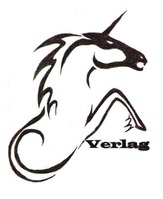
Copyright © 2012 DIOGEN pro cultura magazine & Einhorn Verlag S. Begman, Küsnacht, Schweiz
Design: Sabi / Autors & Sabahudin Hadžialić. Design LOGO magazine - Stevo Basara.
All Rights Reserved. Publisher: Einhorn Verlag S. Begman, 8700 Küsnacht, Schweiz
WWW: http://einhornswisse.weebly.com/
Contact Editorial board E-mail: [email protected]; WWW: http://sabihadzi.weebly.com/
Narudžbe/Order: [email protected]
Pošta/Mail: Freelance Editor in chief Sabahudin Hadžialić, Grbavička 32, 71000 Sarajevo i/ili Dr. Wagner 18/II, 70230 Bugojno, Bosna i Hercegovina
Design: Sabi / Autors & Sabahudin Hadžialić. Design LOGO magazine - Stevo Basara.
All Rights Reserved. Publisher: Einhorn Verlag S. Begman, 8700 Küsnacht, Schweiz
WWW: http://einhornswisse.weebly.com/
Contact Editorial board E-mail: [email protected]; WWW: http://sabihadzi.weebly.com/
Narudžbe/Order: [email protected]
Pošta/Mail: Freelance Editor in chief Sabahudin Hadžialić, Grbavička 32, 71000 Sarajevo i/ili Dr. Wagner 18/II, 70230 Bugojno, Bosna i Hercegovina




